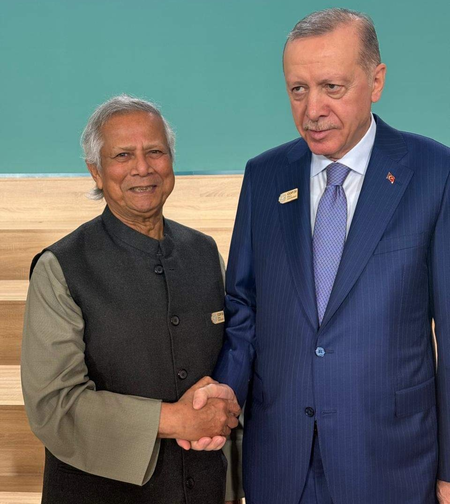

Dhaka: Former Bangladesh Prime Minister Sheikh Hasina’s removal in August 2024 appears to have opened a new avenue for Turkey’s President Recep Tayyip Erdogan to advance his Islamist agenda under the guise of strengthening trade and defence cooperation with Dhaka.
A strategic alliance is taking shape between Turkey, Pakistan’s Inter-Services Intelligence (ISI) and the Jamaat-e-Islami (JeI) of Bangladesh with the shared objective to sabotage India. The trilateral nexus is coordinating the flow of funds, arms and weapons and radical Islamic ideology throughout South Asia, leveraging Bangladesh as a critical hub for orchestrating anti-India activities. The latest developments can now be seen in the context of Turkey openly backing Pakistan during India’s Operation Sindoor following the heinous April 22 Pahalgam terror attack.
Ankara’s increasing engagement with Dhaka could be part of a larger strategy to eliminate pluralism and promote Islamism in the region.
The Jamaat has remained active organisationally despite the ban imposed by the Hasina government. In June, Bangladesh’s Supreme Court restored Jamaat’s registration, thus paving the way for its participation in the next general elections. Jamaat’s re-entry in electoral politics marks a radical shift in Dhaka’s ‘zero tolerance approach’ to religious extremism and terrorism adopted by the erstwhile Awami League government, a move that worked in New Delhi’s favour, given its crackdown on insurgent groups from India’s Northeast that were operating from the Bangladeshi soil.
It is relevant to mention that Turkey’s ruling Justice and Development Party (AKP) began to support the Muslim Brotherhood network, across the world, including Bangladesh through JeI, since 2010.
Intelligence agencies are extending financial and logistical support to Islamist factions in Bangladesh, most notably, the JeI. Yasin Aktay, a former member of the Turkish Parliament and a former advisor to Erdogan, paid a courtesy call on JeI Ameer Shafiqur Rahman at the party’s central office in Dhaka’s Moghbazar, last month (July 26).
The renovation of JeI’s office was allegedly funded by Milli Istihbarat Teskilati (MIT), which is the National Intelligence Organisation of Turkey and works closely with the Turkish diplomatic missions. Ankara’s strategic outreach to South Asia means deepening interest in the region’s defence and geopolitical landscape. Turkey under Erdogan is an ally to Pakistan and Bangladesh but a menace to India and wants an enhanced role in South Asia.
With the progression of time, Erdogan adopted a political Islamist approach, discarding the liberal democratic ideology. In South Asia, Turkey has a largely privileged relationship with Pakistan, its strategic ally, in regional conflicts. Turkey’s approach to South Asia has followed a ‘State Policy’, supported by the Turkish army, foreign ministry, different governments in power, media and the public.
With the general elections due to take place in Bangladesh next year, Turkish and Pakistani intelligence agencies seek to exploit the prevailing political uncertainty in the country to influence the outcome and facilitate the rise of an anti-India regime in Bangladesh.
Dhaka and Ankara have been progressively moving forward in the defence collaboration sector.
A-nine member Turkish delegation led by Haluk Gorgun, Secretary of Turkish Defence Industries Savunma Sanayii Baskani (SSB), visited Dhaka on July 8-9 and met Bangladeshi Chief of Army Staff (CoAS), General Waker-uz-Zaman, Chief of Naval Staff (CNS), Admiral Nazmul Hassan and Chief of Air Staff (CAS), Air Chief Marshal Hassan Mahmud Khan to discuss issues related to defence collaboration, procurement of high-tech defence equipment and facilitating transfer of critical technologies. Apart from agreeing to share experience in naval platforms, modern combat systems and defence technologies, Gorgun also met Yunus and extended Turkey’s support to set up two defence industry complexes in Chittagong and Narayanganj.
Bangladesh has requested for concessional credit lines, soft loans or deferred payment schedules to import Turkey’s Bayraktar TB-2 UAVs, TRG-300 Rocket systems, Otokar Cobra-II Mine Resistant Ambush Protected (MRAPs) and other defence products. Gorgun’s visit aimed at cementing advanced strategic partnerships between the two countries and enhancing Bangladesh’s defence capabilities through foreign investment.
Bangladesh Investment Development Authority (BIDA) Chairman Chowdhury Ashik Mahmud Bin Harun also visited Turkey in May-June 2025 to discuss the setting up of two ‘dedicated defence industrial clusters’ in Chittagong and Narayanganj.
Harun proposed co-production and transfer of technology, offering tax holidays, duty exemptions with operational latitude during his visit to Mikineve Kimya Endustrisi (MKE), a Turkish state-owned corporation, and Mechanical and Chemical Industry Corporation in Kirikkale in Central Anatolia region, which manufactures weapons, explosives, ammunitions, rocket systems, etc.
Discussions centered on procurement of Bayraktar drones, local production of 155 mm artillery shells and assembly of Millî Piyade Tufegi-National Infantry Rifle (MPT)-76 rifles and Platform Machine Gun (PMT) machine guns or Medium Machine guns.
Bangladesh Air Force Chief, Air Chief Marshal Hassan Mahmud Khan and Chief of Naval Staff (CNS) Admiral Nazmul Hassan also visited Istanbul on July 22-27 to attend the 17th International Defence Industry Fair.
Dhaka, meanwhile, is working on getting another Counter-Unmanned Aerial Vehicle (C-UAV) or Counter Unmanned Aircraft Systems (C-UAS) from Bay Galata International, apparently for protection of Saint Martin Island against unmanned aerial threats.
Earlier this year, Turkey’s Trade Minister Omer Bolat led a large delegation to Dhaka and discussed technology transfer, energy issues, infrastructure and investment in the defence sector, logistics, mining, e-commerce and clean energy with Bangladeshi officials. Foreign Affairs Advisor Touhid Hossain visited Antalya to attend Antalya Diplomacy Forum (ADF) on April 11-13 this year and met Chief Executive Officer of Turkish Aerospace, Mehmet Demiroglu. Hossian suggested that Dhaka required a reliable partner in aerospace technology and it would be a win-win-situation for both Bangladesh and Turkey if they cooperate with each other.
Bangladesh-Turkey defence deals and trade relations continue to intensify significantly under the Yunus-led interim administration. Bangladesh has emerged as the fourth largest market for Turkish defence equipment, including Cobra Armoured Personnel Carriers (APCs), short-range-missiles, Mine-Protected vehicles (MPVs) and multi-dimensional rocket defence systems. A key component of the cooperation remains drones and related technologies.
(The writer is an expert on South Asia and Eurasia. He was formerly with Manohar Parrikar Institute for Defence Studies and Analyses. Views expressed are personal)
–IANS
/as
